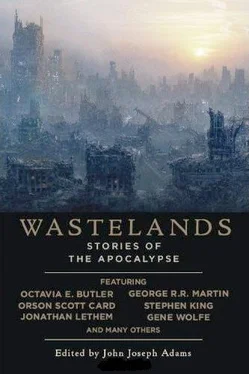As always, it took most of the day to set up. The big animals, stinking of hot fur and unwashed cage bottoms in their eight-foot-high enclosures, came out of the semi-trailers first. Looking lethargic and sick, the tigerzelle, a long-legged, hoofed animal sporting almost no neck below an impressive face filled with saber-like teeth, barely looked up as its cage was lowered to the soggy ground. It hooted softly. Trevin checked its water. "Get a tarp over it right away," he said to handyman Harper, a big, grouchy man who wore old rock concert T-shirts inside out. Trevin added, "That trailer had to be a hundred and twenty degrees inside." Looking at the animal fondly, Trevin remembered when he’d acquired it from a farm in Illinois, one of the first American mutababies, before the mutagen was recognized and named, before it became a plague. The tigerzelle’s sister was almost as bizarre: heavy legs, scaly skin, and a long, thin head, like a whippet, but the farmer had already killed it by the time Trevin arrived. Their mother, as ordinary a cow as you’d ever see, looked at its children with dull confusion. "What the hell’s wrong with my cow?" asked the farmer several times, until they started dickering for the price. Once Trevin had paid him, the man said, "If’n I get any other weird-lookin’ animal, you want I should give you a call?"
Trevin smelled profit. Charging twenty dollars per customer, he cleared ten thousand a week in June and July, showing the tigerzelle from the back of his pickup. He thought, I may not be too smart, but I do know how to make a buck. By the end of the summer, Dr. Trevin’s Traveling Zoological Extravaganza was born. That was the year Caprice rode beside him in a child’s car seat, her momma dead in childbirth. In August, they were going north from Senetobia to Memphis, and, at eleven months old, Caprice said her first words: "Isn’t eighty over the speed limit?" Even then, there was a biting, sardonic tone to her voice. Trevin nearly wrecked the truck.
The crocomouse snarled and bit at the bars as it came out, its furry snout banging against the metal. It threw its two hundred pounds against the door and almost tipped the cage out of the handlers’ grip. "Keep your hands away," snapped Harper to his crew, "or you’ll be taping a pencil to a stub to write your mommas!"
Then the rest of the animals were unloaded: a porcumander, the warped child of a bullfrog that waved its wet, thorny hide at every shadow; the unigoose, about the size of a wild turkey atop four tiny legs, shedding ragged feathers by the handful below the pearl-like glinting horn, and each of the other mutababies, the unrecognizable progeny of cats and squirrels and horses and monkeys and seals and every other animal Trevin could gather to the zoo. Big cages, little ones, aquariums, terrariums, little corrals, bird cages, tethering poles—all came out for display.
By sunset, the last animal had been arranged and fed. Circus flags fluttered from the semi-trailer truck tops. The loudspeakers perched atop their posts.
The park attendant wandered through the cages, his hands pushed deep into his pockets, as casual and friendly as if he hadn’t tried to rip them off earlier in the day. "Y’all best stay in your trucks once the sun sets if you’re camping here."
Suspicious, Trevin asked, "Why’s that?"
The man raised his chin toward the river, which was glowing red like a bloody stain in the setting sun. "Water level was up a couple days ago, over the fences. The levee held, but any sorta teethy mutoid might be floppin’ around on our side now. It’s got so you can’t step in a puddle without somethin’ takin’ a bite outta ya! Civil Defense volunteers walk the banks everyday, lookin’ for the more cantankerous critters, but it’s a big old river. You got a gun?"
Trevin shrugged. "Baseball bat. Maybe we’ll get lucky and add something to the zoo. You expecting crowds for the softball tournament?"
"Thirty-two teams. We shipped in extra bleachers."
Trevin nodded. If he started the music early in the morning, maybe he’d attract folks waiting for games. Nothing like a little amusement before the heat set in. After a couple of minutes, the park attendant left. Trevin was glad to see him walk away. He had the distinct impression that the man was looking for something to steal.
After dinner, Caprice clambered into the upper bunk, her short legs barely giving her enough of a reach to make it. Trevin kicked his blanket aside. Even though it was after ten, it was still over ninety degrees, and there wasn’t a hint of a breeze. Most of the animals had settled in their cages. Only the tigerzelle made noise, one long warbling hoot after another, a soft, melodic call that hardly fit its ferocious appearance.
"You lay low tomorrow. I’m not kidding," said Trevin after he’d turned off the light. "I don’t want you driving people off."
Caprice sniffed loudly. "It’s pretty ironic that I can’t show myself at a mutoid zoo. I’m tired of hiding away like a freak. Another fifty years and there won’t be any of your kind left anyway. Might as well accept the inevitable. I’m the future. They should be able to deal with that."
Trevin put his hands behind his head and stared up at her bunk. Through the screen he’d fitted over the windows, he could hear the Mississippi lapping against the bank. An animal screeched in the distance, its call a cross between a whistle and a bad cough. He tried to imagine what would make a sound like that. Finally he said, "People don’t like human mutoids, at least ones that look human."
"Why’s that?" she asked, all the sarcasm and bitterness suddenly gone. "I’m not a bad person, if they’d get to know me. We could discuss books, or philosophy. I’m a mind, not just a body."
The animal cried out again in the dark, over and over, until in mid-screech, it stopped. A heavy thrashing sound followed by splashes marked the creature’s end. "I guess it makes them sad, Caprice."
"Do I make you sad?" In the truck cab’s dim interior, she sounded exactly like a two-year-old. He remembered when she was a little girl, before he knew that she wasn’t normal, that she’d never "grow up," that her DNA showed that she wasn’t human. Before she started talking uppity and making him feel stupid with her baby-doll eyes. Before he’d forbidden her to call him Dad. He’d thought she looked a little like her mother then. He still caught echoes of her when Caprice combed her hair, or when she fell asleep and her lips parted to take a breath, just like her mother. The air caught in his throat thinking of those times.
"No, Caprice. You don’t make me sad."
Hours later, long after Caprice had gone to sleep, Trevin drifted off into a series of dreams where he was being smothered by steaming Turkish towels, and when he threw the towels off, his creditors surrounded him. They carried payment-overdue notices, and none of them were human.
Trevin was up before dawn to feed the animals. Half the trick of keeping the zoo running was in figuring out what the creatures ate. Just because the parent had been, say, an o-form horse didn’t mean hay was going to do the trick. Caprice kept extensive charts for him: the animal’s weight, how much food it consumed, what vitamin supplements seemed most helpful. There were practicalities to running a zoo. He dumped a bucket of corn on the cob into the pigahump’s cage. It snorted, then lumbered out of the doghouse it stayed in, not looking much like a pig, or any other animal Trevin knew. Eyes like saucers, it gazed at him gratefully before burying its face in the trough.
He moved down the rows. Mealworms in one cage. Grain in the next. Bones from the butcher. Dog food. Spoiled fish. Bread. Cereal. Old vegetables. Oats. The tigerzelle tasted the rump roast he tossed in, its delicate tongue, so like a cat’s, lapping at the meat before it tore a small chunk off to chew delicately. It cooed in contentment.
Читать дальше












